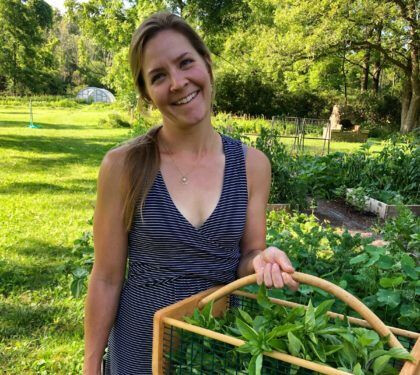A Growing Interest and Opportunity for Farmers Combating Climate Change in New York
When you can get upwards of 90 farmers to attend a field day in late August, you know you’ve caught their interest. At the Western New York Soil Health Field Day, hosted by American Farmland Trust and local partners, farmers and agricultural service providers came out in earnest to learn about regenerative soil practices and emerging carbon markets.
The field day took place on Mulligan Farm in Avon, New York, a farm featured in a case study by AFT that quantified the economic and environmental benefits of soil health practices on the 1,500 head dairy farm in western New York. Forrest Watson, who stewards the land alongside his aunt and uncle, shared his experiences with field day attendees – including how his cropping strategies have changed over time. Local partners from Cornell Cooperative Extension shared results from the partial budget analysis to explain how their soil health system brought the Mulligan Farm a 129% return on investment on their 2,618-acre farm.
Forrest Watson of Mulligan FarmAfter new soil health legislation passed unanimously in Albany last spring, interest has surged from farmers and service providers to learn more about soil health practices. Soil health is of particular interest in climate change discussions, because good soil health practices can reduce carbon emissions. There is growing interest from New York farmers to combat climate change and idea of carbon markets, or ways to offset carbon emissions through good land management practices. AFT’s Conservation Innovation Director, Brian Brandt, led a discussion around carbon markets and payment for ecosystem services for field day attendees.
While the idea has been spearheaded by large corporations and is beginning to gain momentum in the Midwest, it’s still a relatively new concept in New York. Forward thinking farmers, such as Forrest Watson, are at the forefront of agricultural leaders looking to improve the health of their land while reducing their carbon footprint. Their case study found that, using USDA’s COMET-Farm tool, Forrest’s soil health practices have reduced carbon emissions by 252% from one 35-acre field within the study area. Mulligan Farm is one of 13 farms in AFT’s Genesee River Demonstration Farms Network, which highlights the impact of soil health practices on real working farms. The farmers at the event learned first-hand from other farmers in their region about innovative ways to implement soil health practices while maintaining their bottom line.
The field day also offered practical how-to’s for farmers. Nicole Kubiczki, a Soil Scientist for USDA NRCS, demonstrated an in-field soil health assessment tool offered by NRCS that allows farmers to visually assess their land’s health by going through a checklist of soil health indicators.
As discussions on climate change and the need for action grow more urgent by the day, we must not lose sight of the important role played by regenerative farming practices and healthy soils. Farmers face pressures to make their farms more resilient by increasing soil carbon in the face of more frequent and unpredictable extreme weather events, and many are poised to adapt and to implement practices that have benefits for all of us. With continued learning opportunities from AFT and our partners, we may soon see more New York farmers combat climate change resilient practices on the ground here in western New York.




